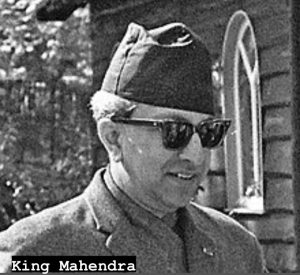-Pushpa Raj Pradhan
Chief Editor
The People’s Review weekly, Nepal

A group of patriotic Nepalis gathered at King Mahendra’s statue at the King’s Way on Friday, 1 Pous, to pay loyal tribute to late King Mahendra for his noble contribution to building the nation.
King Mahendra introduced a partyless Panchayat system on Pous 1, 2017 BS and during his active leadership, the nation took a rapid course of modernization.
Many essential state organs needed for a nation were established, and infrastructural development and modernization process was accelerated on all sides.
It is thus believed that during just one decade of his active leadership, the nation took momentum in all sectors. Therefore, the patriotic people in the country admire King Mahendra as the King who contributed to the nation significantly. They recall the Pous 1 move as the golden day for Nepal.
On the other hand, those, who are categorized as people working for foreigners’ interests, don’t hesitate to call the day, Pous 1, the black day.
We all know the loyalty of Dr Baburam Bhattarai. It is not odd as Bhattarai believes Pous 1 is the black day. Those who fall in Bhattarai’s category, believe Pous 1 is a black day.
Meanwhile, those independent intellectuals believe that the Pous 1 move was essential to save the country’s sovereignty and independence. Either senior journalist Dhurba Hari Adhikari or journalist turned politician Rabindra Mishra, and many other intellectuals believe, the Pous 1 move was essential for safeguarding the nation.
Today, we are practicing “loktantra” but in practice, the nation is seriously suffering from loot-tantra. We have a democracy and our constitution has ensured too many individual rights as fundamental rights of the citizens but they are limited within the pages of the constitution only.
Communists are in the government but during their rule, those people who vote for the communists are the big sufferer. Peasants and laborers are the backbones of the communists but they are the sufferer in reality.
Farmers don’t get the price of the agricultural products; they are unable to get fertilizer on time; during the paddy selling season, the government denies to procure paddy from the farmers directly; this is the sugarcane selling season but the government is unable to announce the minimum price of the sugarcane and the farmers are compelled to dispose their sugarcane at a low price fixed by the sugar factories that too on credit. The government denied procuring paddy from the farmers as the Finance Ministry didn’t provide funds to the concerned authorities.
Nepal, being an agricultural country, until the kings’ direct rule, was exporting agro-products but today all these products are being imported from India. Our farmers don’t get the price of their products and they are facing losses.
The governments in the present loktantra are encouraging youths for going abroad to do dirty and risky jobs.
With the remittance sent by our workers in foreign countries, the government is functioning. Remittance has become the major source of foreign currency earnings, which is not a positive trend for the economy.
Late King Mahendra, in the process of industrialization of the nation, had established many industries by creating employment for thousands of people within the country.
In the name of liberalization and an open market economy, the governments formed after 1990 have disposed the government-run industries at very low prices.

Of course, the concerned political leaders and bureaucrats enjoyed a huge amount of commission while disposing of such industries.
Dr Swarnim Wagle, an advocate of a liberal economy, claims that all the government-run industries were facing a huge loss, therefore, to save the economy, such industries were disposed of. Wagle believes that the government should not do business and run behind profit. However, a government is also a welfare state which should ensure basic economic security for the citizens. Ensuring employment for the people is also an essential job of the government. Even if the factory is at loss, if a large number of the population will get employment, the government should run the factory.
In Nepal, many factories were running in profit and paying an attractive amount of revenue to the government. It is nonsense to say that all the government-run factories were facing a loss. If the government assigns professional experts to manage the government-run factories, there is less chance of facing loss.
Moreover, the governments formed after the 1990 political change, made such government undertakings a venue for recruiting party workers and a venue for making commissions. Such a practice has destroyed all government undertakings.
To conclude, dark days started after the 1990 political change and today, along with the introduction of loktantra, the government needed to spend a huge amount of non-productive expenditure and is compelled to take foreign loans to meet its unproductive expenditure.
# Text source: The People’s Review Weekly, Nepal dated December 21, 2022: Ed. Upadhyaya.
